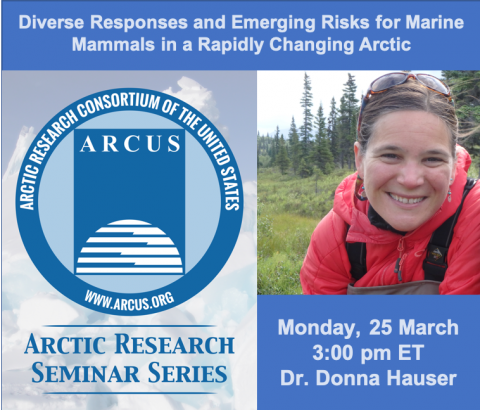Diverse Responses and Emerging Risks for Marine Mammals in a Rapidly Changing Arctic

Abstract:
The rapid and pervasive loss of Arctic sea ice has several potential impacts to ice-associated marine mammals. Declines in sea ice cover are also occurring in concert with expanding anthropogenic activities that may have compounding effects on Arctic marine ecosystems. This talk will examine intersecting issues of recent sea ice loss, Arctic marine mammal responses, and new anthropogenic risks associated with an increasingly navigable Arctic. Dr. Hauser will provide several case studies to illustrate how changes in the timing and extent of sea ice cover affect distribution, migration timing, and foraging behavior of two Pacific Arctic populations of beluga whales. Results suggest diverse and flexible responses by belugas in the face of rapidly changing sea ice conditions, which are in line with other emerging trends from the Pacific Arctic region. Second, she will discuss a recent vulnerability assessment of 80 populations of seven Arctic marine mammal species to vessels in the increasingly ice-free Northwest Passage and Northern Sea Route, which quantified the heterogeneity of risk across species, populations, and regions. Finally, these results will be discussed in the context of ongoing conversations about the future resilience of Arctic marine mammals in changing sea ice ecosystems.
Speaker Details:
Dr. Donna Hauser is a Research Assistant Professor at the International Arctic Research Center, University of Alaska Fairbanks where she pursues interdisciplinary and collaborative research in Alaskan marine ecology. Her research has examined the habitat use, distribution, and behavior of marine mammals for over 15 years. Having grown up in Anchorage, Alaska, her research is firmly rooted in Alaska and focused on the marine mammals that are critical ecosystem components as well as traditional cultural, nutritional, and spiritual resources across the state’s coastal regions.
